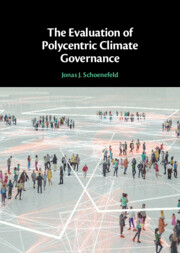Book contents
- The Evaluation of Polycentric Climate Governance
- The Evaluation of Polycentric Climate Governance
- Copyright page
- Contents
- Figures
- Tables
- Preface
- Abbreviations
- 1 Introduction
- 2 Policy Evaluation in Polycentric Governance Systems
- 3 Climate Policy Evaluation: The EU Level, Germany, and the UK
- 4 State-Funded Evaluation
- 5 Society-Funded Evaluation
- 6 Comparing State-Funded and Society-Funded Evaluation
- 7 Evaluation in Polycentric Governance: A Theoretical Analysis
- 8 Conclusions and New Directions
- Book part
- References
- Index
2 - Policy Evaluation in Polycentric Governance Systems
Published online by Cambridge University Press: 06 July 2023
- The Evaluation of Polycentric Climate Governance
- The Evaluation of Polycentric Climate Governance
- Copyright page
- Contents
- Figures
- Tables
- Preface
- Abbreviations
- 1 Introduction
- 2 Policy Evaluation in Polycentric Governance Systems
- 3 Climate Policy Evaluation: The EU Level, Germany, and the UK
- 4 State-Funded Evaluation
- 5 Society-Funded Evaluation
- 6 Comparing State-Funded and Society-Funded Evaluation
- 7 Evaluation in Polycentric Governance: A Theoretical Analysis
- 8 Conclusions and New Directions
- Book part
- References
- Index
Summary
Polycentric governance and evaluation literatures remain disconnected, as they have emerged from separate scholarly communities. This high level of fragmentation significantly impedes necessary theoretical development in order to leverage the synergies that emerge from a combination of the two perspectives. This chapter begins this work, by first assessing polycentric governance as an emerging theory, and then distilling three core, foundational ideas from it, namely that governance centers can and do self-organize, that context matters for governance and that there are interactions between governance centers. Drawing on thinking on monitoring in polycentric governance literatures, the chapter then reveals how these three foundational ideas connect to thinking in policy evaluation literatures, which had also addressed evaluation actors, context as well as, to a lesser degree, how evaluation may be a carrier of insights between different governance centers. The exploration of these ideas demonstrates that evaluation has great theoretical potential to enable polycentric climate governance by potentially linking the efforts of state and non-state organizations.
- Type
- Chapter
- Information
- The Evaluation of Polycentric Climate Governance , pp. 17 - 51Publisher: Cambridge University PressPrint publication year: 2023

